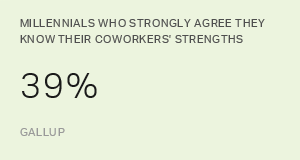Story Highlights
- Employers are asking the wrong questions of their potential employees
- An individual's talents determine their potential for excellence
- The best employers cultivate talent using CliftonStrengths
With the very best of intentions, modern employers often hire the wrong people. Why? Because they're looking at the wrong variables and asking the wrong questions.
Imagine a room full of hopeful 22-year-olds waiting for their turn with an interviewer. Each job candidate is clutching a resume. Some of those vitas barely fill a sheet of paper and reflect little more than a degree program. Some resumes go on for pages, stuffed full of relevant experience, extraordinary relationships and educational attainment.
A hiring manager can read a lot into those resumes. Maybe too much, as bias is known to creep into hiring decisions. And maybe too little, because the one thing that's rarely listed on a resume is also the one thing that's most indicative of success in the role: talent.
Gallup defines talent as a pattern of thought, feeling and behavior that can be productively applied. Talent determines the ceiling of the person's potential. Degrees and extracurricular opportunities can certainly help an otherwise great candidate succeed, but the individual's unique characteristics maximize performance and predict the greatest likelihood of excellence in the role.
Yet, traditional educational accomplishments and high-profile internships are often misconstrued as indicators of potential. They certainly seem like a safe bet for potential employers -- after all, an experienced person can likely handle a similar job. But talent is the key to performance. Your future employees can thrive in roles that give them daily opportunities to do what they do best. And your company will reap the benefits of greater productivity if you position people this way.
Get the Best Out of Your People to Get the Best Out of Your Business
It pays to know where that talent ceiling is because after the person has been hired, onboarded and set on a development plan, talent has a big impact on business results. So big, in fact, that Gallup developed the CliftonStrengths assessment -- a tool that, once completed, helps individuals discover and develop their greatest natural talents into strengths that can be applied at home and in the workplace. Gallup research finds that people who use their CliftonStrengths daily:
- are 8% more productive
- are 9% more profitable
- are rated 12% higher in customer service scores
- are 15% less likely to quit their jobs
Nonetheless, Gallup research reveals that only 20% of U.S. workers think their jobs use their talents.
So, for many people, the opportunity to use talent may only exist outside of work, which is why it's instructive to ask people about their passions. Listen for clues to "yearning" -- the relentless drive to use a particular talent -- because that's a predictor of job performance.
However, it's worth noting that getting the most out of the talents you hire for means developing the person who has them, starting with recruitment and continuing through the whole employee experience. Retaining top talent is easier than hiring for it, sure, but the potential that is inherent in talent can only be realized by coaching to it. Your brightest employees can become your top performers with the right opportunity and daily investment in their strengths. As the father of strengths psychology and inventor of CliftonStrengths Don Clifton said, "There is no more effective way to empower people than to see each person in terms of his or her strengths."
As such, the place to start developing those talents is by completing the CliftonStrengths assessment. Once your employees begin their strengths journey, invest in them on a daily basis as a necessary strategy to create exceptional workers who can also serve as happy, willing and engaged brand ambassadors for your company. Remember, there's a reason you have an open position: either your business is growing and needs talent to expand, or it's because an employee you already invested in found better prospects elsewhere.
Your brightest employees can become your top performers with the right opportunity and daily investment in their strengths.
Either way, it's crucial to create an exceptional work culture that engages your best and brightest and keeps them excited to come to work every day -- not looking for greener pastures.
So take another look at that room of unemployed hopefuls. Don't confuse credentials with capacity. Develop your talented hires for optimal ROI. Getting a more holistic view of each candidate than a curriculum vitae offers makes you more likely to pluck the biggest -- and brightest -- millennial star from the batch.
Discover Gallup's analytics and advice on engaging millennials:
- Learn how CliftonStrengths solutions for managers can help you maximize your team's potential.
- Watch this free, on-demand briefing to learn how to build a strengths-based culture.
- Read our pioneering report How Millennials Want to Work and Live.




